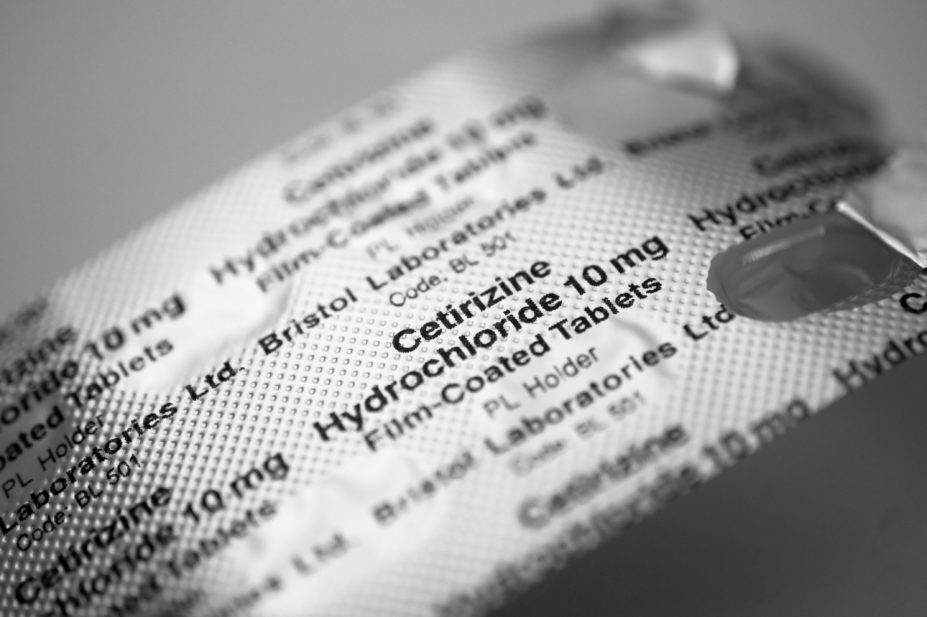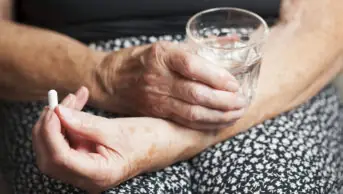
Patricia Phillips / Alamy Stock Photo
Over-the-counter (OTC) antihistamines could significantly improve survival in people with cancer who are receiving immunotherapy treatment, research published in Cancer Cell has suggested.
The study, which was carried out by researchers at the MD Anderson Cancer Center (MDACC) at the University of Texas, began with a retrospective analysis of clinical data of 878 patients undergoing immunotherapy treatment at the MDACC with immune checkpoint inhibitors, such as pembrolizumab and nivolumab.
These were then compared with 1,986 patients with the same diagnosis who were receiving chemotherapy but not immunotherapy.
The researchers found that, among melanoma patients receiving immunotherapy treatment, those taking H1-antihistamines, such as fexofenadine and cetirizine, had a significantly reduced death rate, compared with matched controls who did not (control death rate: 346/779 vs. H1 death rate: 30/99, P=0.005).
The same result was found in lung cancer patients receiving immunotherapy treatment (control death rate: 1,023/1,700 vs H1 death rate: 123/237, P=0.013).
Similar trends were also observed in patients with breast and colon cancer, although statistical significance was not achieved, owing to small patient numbers.
In contrast, H1-antihistamines appeared to have minimal effect on the survival of chemotherapy-treated patients, suggesting that H1-antihistamines may not target tumour cells directly.
Using patient data from The Cancer Genome Atlas, a cancer genomics programme launched in 2005, the researchers also discovered that high expression of histamine receptor H1 in tumours was correlated with markers of reduced immune function — specifically the function of T cells — a poorer response to immunotherapy and poorer survival outcomes
Following on from these findings, the researchers then sought to find out how the histamine receptor H1, and histamine itself, contributed to the immune response.
In preclinical models, they found that the histamine receptor H1 was not present in cancer cells but was highly expressed in cells with a role in immune suppression, found in the environment around the tumour.
They also found that blocking the receptor in these cells — either by genetic knockout or antihistamine treatment — restored the immune response, leading to inhibition of tumour growth.
The authors said that the findings “strongly” supported the use of antihistamines to treat people with cancer who had allergy with high levels of plasma histamine.
“OTC H1-antihistamines can restore T cell function suppressed by cancer cell-secreted and/or allergy-released histamine and improve the efficacy of immunotherapies such as [immune checkpoint blockade] therapies,” they wrote in Cancer Cell.
Study co-lead Yi Xiao, instructor of molecular and cellular oncology at the MD Anderson Cancer Center, said: “In searching for factors that might influence responses to immunotherapy, we were surprised to discover that antihistamines — a mediator of the allergy response — were associated with significantly improved outcomes in patients.
“Looking closer at this relationship, we discovered that histamine, through its receptor HRH1, can promote cancer cell immune evasion and resistance to immunotherapy.”
The authors added that their findings necessitated further clinical studies to prospectively test the effect of H1-antihistamines as adjuvant therapies for enhancing immunotherapy responses in people with cancer.
Stephen Beers, professor of immunology and immunotherapy at the Centre for Cancer Immunology in the Faculty of Medicine at the University of Southampton, said that, although histamine had previously been proposed to have preventive effects on cancer cell growth, its mechanism of action had remained “contentious”.
He said that the results of the study provided “compelling evidence” to suggest that a major factor in this was an observable increase in histamines and histamine receptor H1 in the environment surrounding the tumour, also referred to as the tumour microenvironment.
“These findings were supported by clinical observations of poor immunotherapy responses in allergic patients with high circulating histamine levels,” he added.
“Overall, this paper supports the further prospective clinical investigation of the immunosuppressive role of histamine in the tumour microenvironment and the potential for over-the-counter anti-histamines to be used in combination with immunotherapy to enhance patient outcomes.”
Read more: Going against type: the new class of cancer therapies targeting mutations rather than tissues


